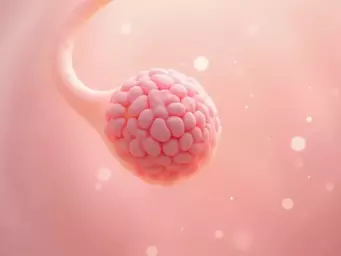Emotional Impact
Common Feelings Faced by Women
- Anxiety & Constant Worry
- Depression & Hopelessness
- Fear (Treatment & Outcomes)
Posted on: 2025-10-20
By: Edyta Drabek
Understanding the emotional toll of ovarian cysts is crucial. As many women face anxiety and uncertainty, recognizing these feelings can be the first step toward healing.
Living with ovarian cysts involves more than just physical symptoms; it often presents significant emotional challenges. Understanding these common feelings and triggers is crucial for effective management and support, just as it is important to manage ovarian cyst pain naturally.
Hormonal fluctuations can affect brain neurotransmitters, leading to irritability and mood swings, creating a challenging cycle.
Sharing experiences can inspire others and build a supportive community, fostering collective healing and understanding.
Dealing with ovarian cysts goes beyond just the physical symptoms; the emotional burden can be quite heavy. Many women experience feelings of anxiety, depression, and fear related to their diagnosis and treatment. It’s essential to acknowledge that these feelings are valid and common. You're not alone in this, and understanding the emotional impact can be a key step towards healing.
Often, the uncertainty of what ovarian cysts mean for your future can leave you feeling overwhelmed. This emotional toll can affect your daily life, relationships, and overall wellbeing. Recognizing these feelings is the first step to managing them effectively.
The emotional strain associated with ovarian cysts can manifest in various ways. For some, there may be persistent worries about health outcomes or the possibility of surgery. It’s normal to feel a sense of loss of control over your body, leading to stress and emotional unease.
These emotions can significantly impact your relationships and daily activities. It’s important to find ways to address and manage these feelings, which can lead to a more balanced emotional state, just as you would naturally balance hormones for ovarian cysts.
Hormonal fluctuations caused by ovarian cysts can contribute to mood disorders, creating a cycle that can be challenging to break. For instance, the hormonal imbalance often leads to symptoms such as irritability and mood swings. Understanding this connection is essential for coping.
When your body experiences hormonal changes, it can affect neurotransmitters in the brain, which are responsible for regulating mood. Keeping track of how these changes correlate with your emotional state can provide insight into your feelings and help you manage them more effectively.
Recognizing the specific emotions you might experience during treatment for ovarian cysts is crucial. Women frequently face a range of emotional challenges that can feel isolating, but sharing these experiences can provide comfort and support.
During treatment for ovarian cysts, many women report experiencing specific symptoms that relate to their emotional state. Here are some common emotional responses:
Understanding these emotional symptoms can help you connect with yourself and others who share similar experiences.
Identifying triggers that lead to negative emotions during treatment can be empowering. It’s important to recognize what situations or thoughts exacerbate your feelings of anxiety or sadness. Here are a few common triggers:
Once you identify these triggers, you can develop strategies to manage your emotional responses. Whether it’s through mindfulness practices or seeking support, you have the tools to navigate your journey with greater ease.
What has been your biggest emotional challenge while dealing with ovarian cysts? Share your thoughts and experiences below:
Recognizing and addressing the emotional challenges faced by women with ovarian cysts is crucial for overall wellbeing. When we talk about ovarian cysts, it’s easy to focus on the physical symptoms. However, the emotional toll can be just as significant. Understanding this impact can empower you to seek the support you need and deserve.
At Ovarian Cysts Wellness, I’m passionate about creating a community where women can share their experiences. It’s important to acknowledge that feeling overwhelmed or anxious is not uncommon. By being aware of these emotional challenges, we can better equip ourselves to handle them.
These are just a few elements that can help us navigate the emotional landscape of ovarian cysts. The more we share and understand, the stronger we become as a community.
A: Women often experience anxiety, depression, and fear related to their diagnosis, treatment, and potential outcomes. Feelings of constant worry, hopelessness, and uncertainty are prevalent.
A: Hormonal fluctuations can impact brain neurotransmitters, leading to symptoms like irritability, mood swings, and general emotional unease. This connection creates a challenging cycle that can exacerbate existing emotional symptoms.
A: Common triggers include medical appointments, extensive online research about ovarian cysts, and social situations where others may not understand your experience. Recognizing these triggers is key to managing emotional responses.
A: Self-advocacy involves communicating your feelings clearly to healthcare providers, asking questions about treatment and emotional support options, and actively seeking resources like community groups or therapy. This empowers you to prioritize your emotional health.
A: Sharing personal experiences and insights within a supportive community can alleviate feelings of isolation, provide validation, and foster collective healing and understanding. It helps women realize they are not alone and can learn from others' journeys.
As we continue on this journey, I want to encourage you to implement the strategies discussed here. Seeking additional support is a sign of strength, not weakness. Hope and resilience are within reach when we take proactive steps to care for our emotional health.
Connecting with others who share similar experiences can offer a sense of relief and validation. Remember, you’re not alone in this journey, and it’s perfectly okay to reach out for help.
Self-advocacy is a powerful tool in navigating healthcare and emotional support resources effectively. By voicing your needs and concerns, you can ensure that your emotional wellbeing is prioritized. Here are some ways to practice self-advocacy:
Taking charge of your emotional health can foster a deeper sense of control and empowerment. It’s your journey, and you have the right to advocate for what feels best for you, just as you would when considering diet for ovarian cysts: what to eat and what to avoid.
I invite you to share your personal experiences and insights in the comments below. Your story could inspire another woman facing similar challenges. By engaging with one another, we can build a supportive community that thrives on shared knowledge and empathy.
Let’s create a space where we can uplift each other, learn from our experiences, and empower ourselves together. Your voice matters, and I can’t wait to hear from you!
Here is a quick recap of the important points discussed in the article:



 Understanding ovarian cysts can feel overwhelming, especially if you're navigating discomfort on you
Understanding ovarian cysts can feel overwhelming, especially if you're navigating discomfort on you
 Building your personalized self-care kit can be a transformative experience, especially during chall
Building your personalized self-care kit can be a transformative experience, especially during chall
 Many women are unaware that ovarian cysts are a common issue, with many experiencing them at some po
Many women are unaware that ovarian cysts are a common issue, with many experiencing them at some po